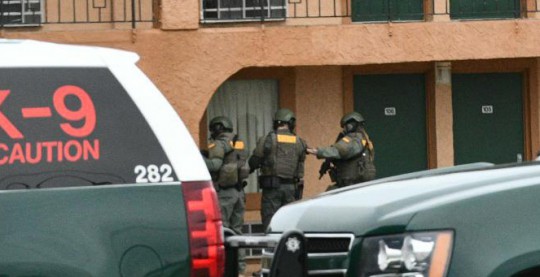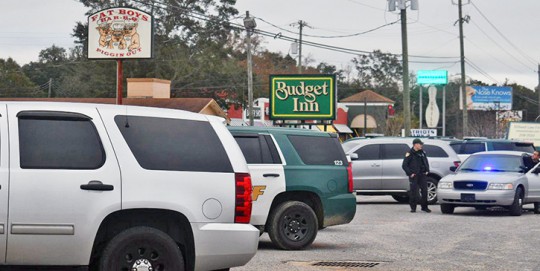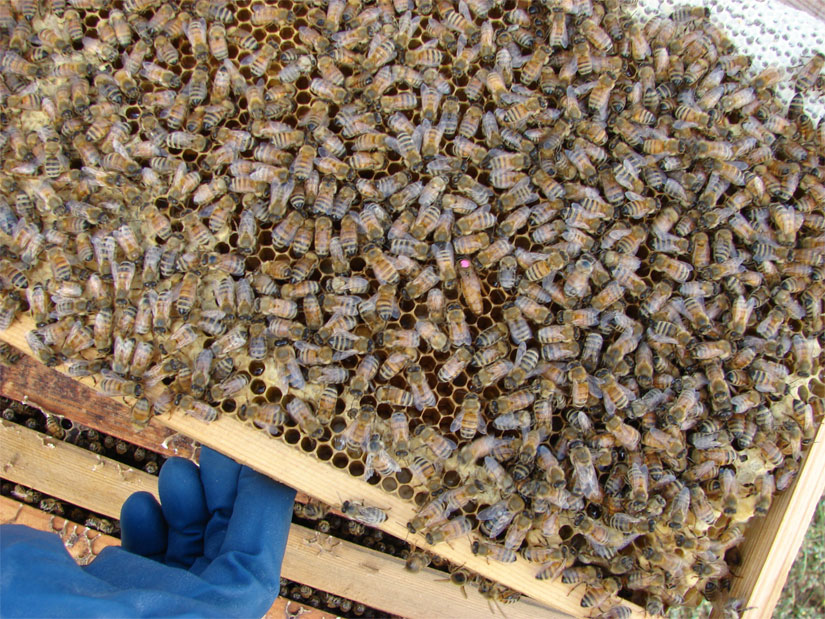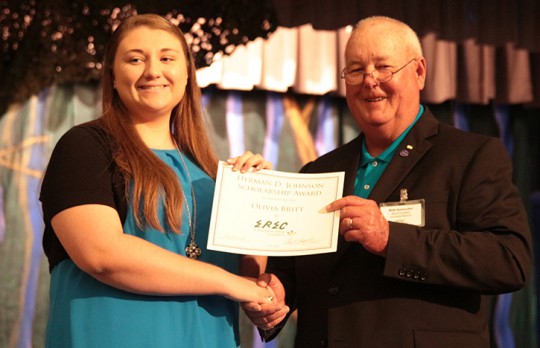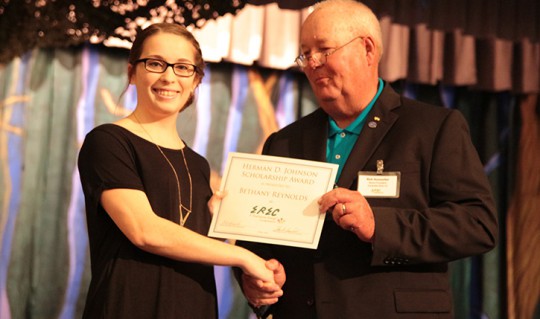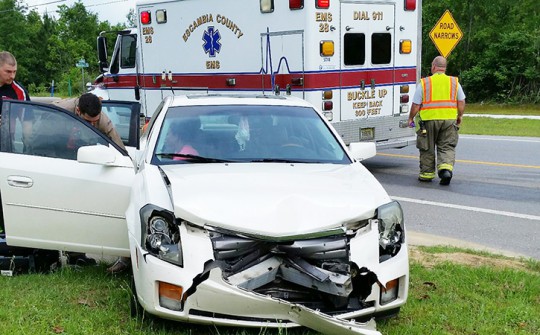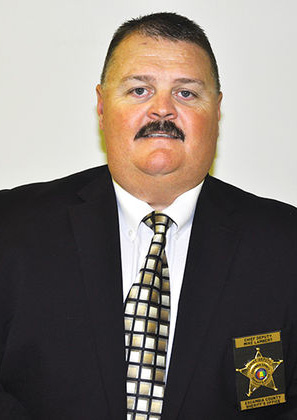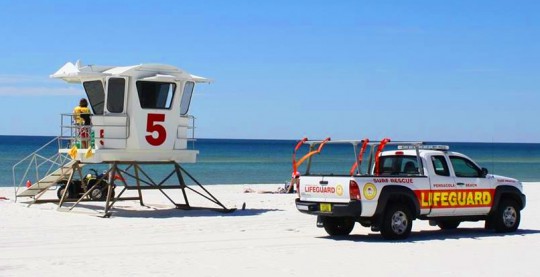SWAT Standoff Ends When Suspect Turns Gun On Himself
January 13, 2018
A SWAT standoff with a suspect in a motel room on Nine Mile Road came to an end late Friday afternoon when the man reportedly shot himself.
The armed man was inside a ground-level room at the Budget Inn. The Escambia County Sheriff’s Office, SWAT and a negotiation team responded with other law enforcement to the motel across from the John R. Jones Athletic Park. Deputies were attempting to arrest the man on three felony domestic abuse warrants including battery with a firearm when he barricaded himself inside the room with a weapon.
Deputies made contact with the man through the door, but he refused to come out for over an hour.
About 5 p.m., deputies heard a single gunshot from the room and made entry. The man was transported by Escambia County EMS to an area hospital suffering from a single self-inflicted gunshot would.
The man’s name and condition have not been released.
NorthEscambia.com photos by Kristi Barbour, click to enlarge.
North Escambia Bee Association To Hold Annual Meeting
January 13, 2018
The North Escambia Beekeepers Association will hold its annual seminar on February 24 at the Molino Community Center from 8 a.m. until 5 p.m..
There will be both a beginner’s course and an advanced course. The advanced course will feature lectures from Dr. Dennis vanEnglesdorp from the University of Maryland, Jeff Willard from Milton, Johnny Thompson from Mississippi and Andrew Finch, the area’s state apiary inspector.
To continue to increase the number of beekeepers in the area the association will also offer a beginner’s course. It will be a very condensed and thorough course on how to start in the hobby/career. Participants will learn basic bee biology, the tools and equipment necessary to begin, best practices, pest management, bee installation, honey processing, and state laws regarding bees and honey. Weather permitting there will also be open hive demonstrations.
In the advanced course, vanEnglesdorph will provide informaton on the Varroa mite. In addition, he will also teach a course on Best Beekeeping Practices. Thompson will explain what Varroa Sensitive Hygienic bees are and how they are changing the beekeeping industry.
Finch will offer information about the blooming cycle of plants in the area. YouTube sensation Willard will present his independent research and demonstrate how to build hive beetle barriers. There will also be lectures on catching swarms, splitting hives, and, in the advanced course only, and “ask the experts” for audience members. Weather permitting there will also be open hive demonstrations in the course.
“The only way to save our bees is through education. By educating both the public and beekeepers we have seen an increase in the amount of hives located in our area. More hives means more bees to pollinate crops, small gardens, trees, and flowers. A win for the bees and a win for the residents of both Escambia and Santa Rosa counties. Each year we try to bring in top research scientists in the field to keep our local beekeepers up to date on the very best beekeeping practices. By doing this we hope to keep more hives alive and more people and families interested and excited in the hobby,” said Danielle Ochsenreiter of the North Escambia Beekeepers Association.
Tickets are $25 per person with lunch included before February 14 and can be purchased through Paypal at www.northescambiabees.com. At the door and after January 14, tickets will be $35. Tickets for children under 18 are $8. For more information, contat Danielle Ochsenreiter at (850) 777-0087 or Tim Ashby at (850) 380-2268.
EREC Members: Apply Now For Scholarship Awards
January 13, 2018
Escambia River Electric Cooperative will award scholarships to graduating seniors in Escambia and Santa Rosa counties whose parent or guardian is a member of the cooperative. Two $4,000 scholarships – awarded in honor of former director Herman D. Johnson – will be offered. Students must show proof of enrollment and maintain a grade-point average of 2.5 to continue to receive the funds each year.
For scholarship applications, seniors should check with their high school guidance counselors; contact EREC’s Marketing and Communications (850) 675-4521 or (800) 235-3848; or go online at www.erec.com. The deadline to submit applications is March 1. Winners will be announced at EREC’s Annual Meeting on April 28.
This is EREC’s 21st year offering scholarships. In the past, capital credits issued by EREC that were unclaimed had to be turned over to the state. Legislation now allows such funds to be deposited into a qualified educational charity fund. The EREC membership voted to use these funds in the form of scholarships for graduating seniors in EREC’s service area.
Pictured: Previous EREC scholarship winners Oliva Britt from Jay High School (top) and Bethany Reynolds from Northview High School (below). NorthEscambia.com file photos, click to enlarge.
MLK Day Holiday Closure List
January 13, 2018
The following will be closed on Monday, January 15 in observance of the Martin Luther King Jr. holiday.
Escambia County:
- Escambia County Board of County Commissioners - All departments, including:
- Escambia County Animal Shelter
- West Florida Public Libraries (All locations)
- Escambia County Property Appraiser
- Escambia County Tax Collector
- Escambia County Supervisor of Elections office
- Escambia County Clerk of the Circuit Court & Comptroller’s office
- Waste Services Administrative Offices
- ECAT buses will not operate Monday, Jan. 15. There will be no UWF Trolley or Express Shuttle services. All services will resume schedules Tuesday, Jan. 16.
Escambia County Exceptions:
- The Perdido Landfill will have regular hours Monday, Jan. 15.
Century, Pensacola, Jay:
All departments and offices will be closed.
ECUA:
ECUA offices will be closed Monday. No change in residential and commercial sanitation collections for ECUA customers in Escambia and Santa Rosa counties.
Florida Gov’t Weekly Roundup: Pomp, Circumstance And Priorities
January 13, 2018
Lubricated by cocktails at an annual pre-session Associated Industries of Florida fete Monday, the first week of the 2018 legislative session bore many of the usual hallmarks of the 60-day pageant.
Flowers festooned lawmakers’ desks Tuesday as the session began, and rhetoric-laden speeches were met with partisan appreciation or rebukes.
But with two empty seats in the Senate because of scandals about sexual misconduct, the opening-day atmosphere on the Capitol’s fourth floor wasn’t quite the same as it has been in sessions past.
 Fist bumps replaced hugs, even between longtime colleagues. Men nervously joked about whether compliments about female acquaintances’ appearances would be misconstrued. Legislative aides sat in on tete-a-tetes where parties of two — a male lawmaker and a woman lobbyist — once sufficed.
Fist bumps replaced hugs, even between longtime colleagues. Men nervously joked about whether compliments about female acquaintances’ appearances would be misconstrued. Legislative aides sat in on tete-a-tetes where parties of two — a male lawmaker and a woman lobbyist — once sufficed.
The changes came after Jeff Clemens, a Lake Worth Democrat, quit the Senate after admitting to an extramarital affair with a lobbyist and Jack Latvala, a Clearwater Republican, resigned amid investigations that he allegedly groped a Senate aide and engaged in pattern of verbal misconduct.
The weight of the sex scandals grew even heavier Tuesday, when Senate President Pro Tempore Anitere Flores, R-Miami, and Senate Minority Leader Oscar Braynon, D-Miami Gardens, acknowledged they had an extramarital affair. They apologized after the launch of an anonymous website with photos and videos that showed Flores entering Braynon’s condo late at night and leaving the next morning.
Lobbyists and lawmakers had mixed views of the exposure of sexual hijinks and sexual harassment, which fall on two ends of the spectrum of inappropriate behavior.
“People are not infallible. There’s always been misconduct between humans. I don’t believe it is going to have an impact as far as the policy and the way the policy is shaped. I believe it will have an impact on the decorum. I’ve been doing this over 30 years. We need it to have an impact on the decorum because we lost decorum,” lobbyist Victoria Zepp said.
GOODBYE, GUV
In his last State of the State speech, Gov. Rick Scott on Tuesday asked lawmakers to help make it harder to pass future tax increases by requiring “supermajority” votes by the Legislature.
“This is my last session to cut taxes,” Scott told House and Senate members on opening day. “And we must acknowledge that, unfortunately, at some point, there will be politicians sitting in this chamber who are not as fiscally responsible as we are today.”
Scott wants lawmakers to back a constitutional amendment, which if approved by voters in the fall, would require two-thirds votes by the Legislature to pass tax increases. The Republican-led Legislature can now pass a tax increase by majority votes, with the last increase being a $1 hike in 2009 on the tax on packs of cigarettes.
Scott discounted arguments that adopting a higher voting requirement on tax increases would hamper future state leaders in dealing with financial challenges.
Since moving into the governor’s office in January 2011, Scott has made lower taxes one of his calling cards. His final legislative agenda includes a modest package of tax breaks in addition to the constitutional proposal.
“There were the naysayers who told us there was no way that a businessman with no experience in politics or government could possibly be successful at helping turn Florida’s economy around,” Scott said. “Fortunately for all of us, the naysayers were wrong.”
During Tuesday’s speech, Scott also made a pitch for other 2018 priorities, which include spending $53 million to help abate a growing opioid crisis.
And with sexual harassment scandals rocking the nation and Tallahassee, Scott outlined steps his office has taken to help victims.
He called on lawmakers to pass legislation to protect state employees who may have witnessed harassment, encouraging them to participate in investigations.
“Things have got to change, and it starts right here in this building,” Scott said. “We all must join together and send a very strong message: Florida stands with victims.”
Senate President Joe Negron also touched on the issue in his opening-day speech, reiterating his chamber will have “zero tolerance” for sexual harassment or misconduct against employees and visitors.
“State government should lead by example in instituting policies that ensure employees feel safe when they come to work and comfortable to confidentially report inappropriate behavior by any person,” Negron, R-Stuart, said.
As part of the opening-day events, the Senate president and House speaker typically outline their priorities for the session. Negron, for example, spoke of the need to address impacts from Hurricane Irma and to further build up the state university system.
And Negron said the Senate will work with Scott on a request for additional pay raises for law-enforcement officers and with House Speaker Richard Corcoran, R-Land O’ Lakes, on expanding school choice.
“One thing I know is, it doesn’t matter at all to the Floridians we represent where these ideas originate,” Negron said. “They’re worried about taking care of their families. Taking their students to ballet practice, to Little League practice. … Families are busy trying to survive and prosper and they don’t care about this home-and-away football game mentality that some people have.”
Dubbing the Florida House as the “House of reformers,” Corcoran outlined priorities that are almost certain to stir debate — and controversy, such as a controversial “anti-sanctuary cities” proposal (HB 9) that would require state and local agencies to cooperate with federal immigration enforcement and carry hefty penalties for local officials who fail to comply.
“Now we have politicians who say they want to make the entire state of Florida a sanctuary state, just like California. That’s unacceptable,” Corcoran said Tuesday. “You cannot have politicians who go out there and decide that the rule of law is a multiple-choice test and you simply get to go out there and say, ‘None of the above.’ “
HIGHER-ED, IMMIGRATION TOP PRIORITIES
Two days after the start of the session, the Senate unanimously signed off on one of Negron’s top priorities — a sweeping higher-education measure that would permanently expand Bright Futures merit scholarships for some 94,000 university and college students.
The legislation (SB 4) revives a higher-education initiative, known as the “Florida Excellence in Higher Education Act,” that was vetoed by Scott last year, when he objected to its impact on the state college system.
Despite Scott’s veto, most of the changes occurred this academic year because they were included in the state budget. But the new bill would make those changes permanent and expand them.
“The bill we passed today really transforms our commitment to higher education,” Negron said.
The House, meanwhile, spent hours debating Corcoran’s effort to prevent “sanctuary” cities. But it remains unclear whether the measure will make it through the Senate, which has refused to take up similar bills in the past.
Under the proposal — dubbed the “Rule of Law Adherence Act” — state or local governmental entities or law enforcement agencies would be fined up to $5,000 for each day they are deemed to be out of compliance. The bill would require complying with U.S. Immigration and Customs Enforcement detention requests and repealing current sanctuary policies.
The House took up the issue Thursday, a day after federal immigration officials raided 7-Eleven convenience stores in 17 states, including Florida, resulting in 21 arrests. The debate started on the same day President Donald Trump sparked outrage after reportedly questioning why the U.S. should accept immigrants from “s—hole countries” such as Haiti and African countries.
Critics of the measure brand it an election-year political ploy by GOP House leaders, including Corcoran, who could run for governor.
“Undocumented immigrants are just as American as the rest of us. They just don’t have the paperwork. This bill creates two criminal justice systems, one for undocumented immigrants and one for everyone else,” Rep. Carlos Guillermo Smith, D-Orlando, said.
OIL DRILLING WHIPLASH
Florida waters were removed Tuesday from a new White House proposal to open previously protected parts of the Atlantic Ocean and eastern Gulf of Mexico to offshore oil and gas drilling.
Scott hailed the move, but critics questioned whether the move and manner of announcement by the Trump administration were done to further Scott’s political career.
Interior Secretary Ryan Zinke, making a brief appearance Tuesday night at Tallahassee International Airport, credited the governor, who was by his side, for the decision to remove Florida from the drilling proposal, which had been announced just days earlier.
“The great state of Florida has expressed and the governor has expressed his desire not to drill and not to have production platforms off the coast,” Zinke said when asked why Florida waters were removed from the pending review while waters off neighboring states remain eligible. “We think we have the assets in this country onshore and offshore and the rest of the Gulf to meet the president’s desire for energy dominance.”
The initial proposal was widely condemned by Florida politicians from both parties, including Scott. After the Trump administration reversed course Tuesday, U.S. Sen. Bill Nelson — a Democrat expected to be challenged for his seat later this year by Scott — was quick to call Zinke’s action a “political stunt.”
“I have spent my entire life fighting to keep oil rigs away from our coasts,” Nelson said in a statement. “But now, suddenly, Secretary Zinke announces plans to drill off Florida’s coast and four days later agrees to ‘take Florida off the table?’ I don’t believe it. This is a political stunt orchestrated by the Trump administration to help Rick Scott, who has wanted to drill off Florida’s coast his entire career. We shouldn’t be playing politics with the future of Florida.”
STORY OF THE WEEK: The 2018 legislative session began Tuesday, with Gov. Rick Scott, House Speaker Richard Corcoran and Senate President Joe Negron laying out their priorities.
QUOTE OF THE WEEK: “True predators are out there. I don’t want to have one broad brush for everyone. Those people need to be held accountable. When we have a no-tolerance policy, no tolerance doesn’t mean you cut off everybody’s head. Some need off with their head. But most of them need a whack upside the head.” Lobbyist Victoria Zepp, on the reaction to sexual harassment and misconduct scandals in the Capitol.
by Dara Kam, The News Service of Florida
Escambia County Explores How To Build A Bridge Faster, Smarter And Cheaper
January 12, 2018
Escambia County Administrator Jack Brown believes the county has found a way to build bridges faster, smarter and cheaper.
In early November of last year, the bridge on Arthur Brown Road (CR99A) at Freeman Springs Branch outside Walnut Hill was closed after a failed Florida Department of Transportation inspection.
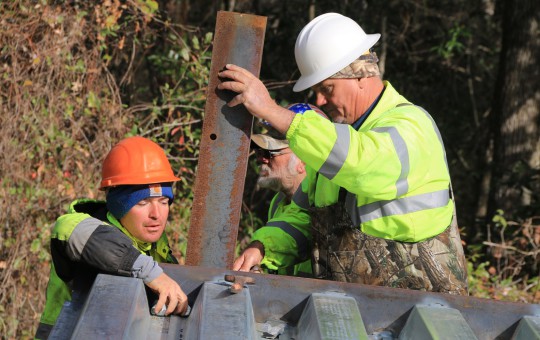 Fast forward to last Friday morning….the new 24-foot wide bridge arrived on a truck from the Big R Bridge company in three main pieces, plus guardrails and buckets of bolts. Think of it as a giant Erector Set.
Fast forward to last Friday morning….the new 24-foot wide bridge arrived on a truck from the Big R Bridge company in three main pieces, plus guardrails and buckets of bolts. Think of it as a giant Erector Set.
In just a few minutes, the three bridge sections were on the ground, and it was all hands on deck installing guardrails as simple as just bolting them on. By Saturday morning, the three sections were hoisted into place, creating the 40-foot span across Freeman Springs Branch.
For a photo gallery, click here.
“This is really promising,” Escambia County Commissioner Steven Barry said as he watched the bridge assembly. “This could very well be the future of bridges in Escambia County”
“I really think this will continue to be a good thing for the citizens of Escambia County,” Brown said. “It really saves times, and saves money. It ultimately is good thing for the citizens because we can get these bridges back open faster.”
The North Escambia area from Molino north to the Alabama line has been dotted with bridge closures over the past year or more. Some of the closures were planned projects funded by the state, while others were emergency closures due to an aging and failing infrastructure…most North Escambia bridges on county roads were constructed 50 or more years ago with concrete spans on wood pilings.
“We can’t use these metal span bridges on FDOT funded projects,” Brown said. “But we can look at the costs benefits on county projects that we fund.”
 These are not those temporary metal bridges that North Escambia drivers have seen alongside some projects — those metal deck bridges that make the strange sounds as vehicles roll across.
These are not those temporary metal bridges that North Escambia drivers have seen alongside some projects — those metal deck bridges that make the strange sounds as vehicles roll across.
The new bridges are solid American steel with corrugated decks that are paved with asphalt after installation for decades of service.
“This bridge will probably save us over six months time in getting this road back open,” Assistant County Engineer Joy Jones said as she watched the bridge assembly on Arthur Brown Road.
“Time is important here,” Brown said, “even a life safety issue. The people on the other side of this bridge have been cut off from fire and EMS other services without a major detour.”
The cost for the actual bridge was around $80,000. The county still hired a contractor to construct the steel abutments to support the bridge and do the roadwork leading up to the bridge.
The project was slowed by the holiday period at the end of December and a week of weather too cold to pour concrete or lay asphalt, Jones said.
“We’ll probably have this back open within about a month,” she said.
For a photo gallery, click here.
NorthEscambia.com and courtesy photos, click to enlarge.
No-Fault Insurance Repeal Gets Senate Backing
January 12, 2018
An effort to eliminate the state’s “no-fault” auto insurance system got rolling Wednesday in the Senate, amid concerns the change would not significantly lower rates.
Also, questions continue over the fate of the Senate proposal (SB 150) because of medical coverage requirements that are not included in a similar measure (HB 19), which is teed up for a vote by the full House.
The Senate Banking and Insurance Committee on Wednesday voted 10-1 to support the bill by Sen. Tom Lee, R-Thonotosassa. It would repeal the no-fault law, which requires motorists to carry $10,000 in personal-injury protection, or PIP, coverage to help pay medical expenses after accidents.
“I’m trying to make sure we don’t raise premiums on Floridians, but at the same token that we protect as many options for consumers to get medical care in the event of an accident,” Lee said after the meeting. “It’s a balancing act.”
The proposal must still go before two more committees before reaching the Senate floor.
Since a 2012 effort to reform the no-fault system — championed by Gov. Rick Scott and then-state Chief Financial Officer Jeff Atwater — efforts have increased in Tallahassee to replace it with a tort-based system.
The 2012 law, in part, required people involved in crashes to seek treatment within 14 days, put a $2,500 cap on coverage for non-emergency conditions, eliminated massage therapists and acupuncturists from getting paid for medical coverage and set new requirements for chiropractic visits.
The 2012 changes were considered a last-ditch effort to maintain the no-fault system after rates increased because of fraudulent claims.
Lee’s measure would require motorists to carry $5,000 in what is known as medical payments coverage, or MedPay, and minimum amounts of bodily-injury coverage that would increase over time.
Sen. Rene Garcia, R-Hialeah, called his vote for the measure a “soft yes,” saying he will continue to seek lower projected premium increases.
“Insurance rates will go up for those that have just PIP policies,” Garcia said. “So, that means that a lot of us in the minority communities, for a lot of us that live in South Florida, some of those rates for those that have insurance just PIP-only policies, their rates will go up.”
Under Lee’s MedPay rules, people would be required to seek medical attention within 14 days of injuries occurring.
Through an amendment, Garcia was able to attach language to the bill that would allow MedPay to also cover chiropractic and dental costs.
Mark Delegal, a lobbyist representing State Farm, which is opposed to the Senate proposal, called Lee’s amended measure “PIP version 2.0” and warned that the system will remain “costly and inefficient.”
“You’re throwing that right back on it, with a broad spectrum of providers, and without knowing the costs of that up front,” Delegal said. “It’s going to be unaffordable to a lot of people.”
Lee’s proposal is estimated to initially raise rates about $4 a year, as the savings from the elimination of no-fault would be offset by increases in premiums for bodily-injury liability coverage and uninsured-motorist coverage.
“You could lower insurance premiums, if that was our solitary goal, by gutting insurance coverage and having people drive around with almost no coverage,” Lee said. “The question is what is the most efficient system.”
The House measure sponsored by Rep. Erin Grall, R-Vero Beach, faces opposition from some insurers, business groups and medical providers. It has been projected to save motorists on average about $80 a year.
Grall’s proposal, which was backed by the House Commerce Committee in an 18-7 vote last month, would eliminate the system’s limits on lawsuits. Drivers at fault in accidents would be fully liable for damages, with the minimum bodily-injury coverage under Grall’s proposal being $25,000 for damages for injury or death of one person and $50,000 for injury or death of two or more people.
Lee’s proposal, starting Jan. 1, 2019, would set a minimum of $20,000 for bodily injury protection that includes coverage for the injury or death of one person and $40,000 for injury or death of two or more people.
Individual premiums would be expected to increase as the minimum coverage would grow to $25,000 and $50,000 two years later and to $30,000 and $60,000 on Jan. 1, 2023.
by Jim Turner, The News Service of Florida
NorthEscambia.com file photo, click to enlarge.
Lambert Announces Candidacy For Escambia (AL) Sheriff
January 12, 2018
Submitted article.
Escambia County (Ala.) Sheriff’s Office Chief Deputy Mike Lambert has announced he will be a candidate for sheriff in the June 5 Democratic primary.
Current Sheriff Grover Smith has announced he will not seek re-election to another term.
“I have the experience,” Lambert said. “I’ve learned and come up through the ranks. I know what it’s like to be a patrol officer, investigator and administrator. I know what it takes to be the sheriff.”
“My family lives in Escambia County, my children go to school in Escambia County,” Lambert said. “This is home. My wife works for the Escambia County School System and my son is a fireman at the Atmore Fire Department.”
Lambert, 48, is a native of Monroe County saying he grew up off of Butler Street at the Monroe, Conecuh and Escambia county lines.
A 1988 graduate of J.U. Blacksher High School, Lambert attended Patrick Henry State Jr. College and completed the Emergency Medical Technician Program and went to work with the ambulance service in Monroe County. He attended Wallace Community College in Selma and completed his advanced EMT certificate.
Lambert began his law enforcement career under Monroe County Sheriff Tom Tate in 1991 as a sheriff’s deputy. While working full time as a deputy, Lambert continued to work with the ambulance service.
Lambert then attended the University of South Alabama to become a paramedic, while still working as a deputy sheriff.
Lambert was promoted to the rank of corporal in Monroe County and in 1997 Escambia County Sheriff Tim Hawsey recruited him to come work with the Escambia County Sheriff’s Office. Lambert joined the sheriff’s office as a deputy assigned to investigations. Lambert moved to the drug task force in 1999 and was promoted to sergeant in 2000.
Lambert was also the first law enforcement officer in Escambia County to be certified as a clandestine lab technician for taking down and cleaning up methamphetamine labs.
Lambert continued with the sheriff’s office when Grover Smith was elected sheriff.
He was a lieutenant when the Flomaton Police Department’s chief position came open.
“Sheriff Smith and I discussed it and I made the decision to go to Flomaton,” Lambert said.
Lambert served as police chief in Flomaton from 2005 to 2008 while also maintaining his deputy sheriff status.
In 2008, Lambert returned to the sheriff’s office as Sheriff Smith’s chief deputy.
“In July, I’ll start my 28th year in law enforcement,” Lambert said. “This is what I’ve done most of my adult life. I’ve been a deputy sheriff my entire career. I’m raising children in Escambia County like everybody else and I genuinely care about the citizens of Escambia County.”
Lambert said he feels his experience in all phases of law enforcement make him qualified to be the next sheriff.
“There’s a lot more to being sheriff than going out and arresting folks,” he said.
He’s attended multiple classes from working basic crime scenes to homicide. He has training in animal control to narcotic trafficking.
Lambert also completed administrative classes, including the Southern Police Institute Chief Executive Leadership Class in Washington, D.C.
“I’ve been trained by the DEA, ATF, FBI, Secret Service and numerous state and local agencies,” Lambert said.
Lambert is also a certified pilot and is certified as a SCUBA rescue diver.
“I’ve had a lot of training, but the main thing is working with people to make our county safe for everyone,” Lambert said. “For most of my career I’ve been in administrative positions and have worked on budgets for sheriff’s offices and police departments.”
He has helped launch community oriented policies in the rural areas of the county like neighborhood watch programs to train people to become the eyes and ears for law enforcement.
He recently launched a program where he and other deputies go to churches to implement safety programs and train members of the congregation.
Lambert also said he will continue to have deputies in the schools and continue the DARE program if elected sheriff.
“The school resource officer program is very important,” Lambert said. “If I’m elected I’ll keep them in the schools to protect our children and our teachers.” Lambert said the simple fact of having a patrol car parked outside a school and having a deputy walking the halls is a great deterrent to problems.
He said he will also continue a program to monitor registered sex offenders across the county. He said currently two deputies are assigned to that task and check on sex offenders on a daily basis to make sure they are in compliance with their sentencing orders. He said because of that, many sex offenders have been arrested for violating the Sex Offender Notification Act.
He said another key to being sheriff is to stay on top of technology, and he was instrumental in having all deputies fit with body cameras. Deputies now have laptop computers and printers inside their patrol vehicles.
“This allows them to stay out in the community instead of having to come back to the office to do reports,” Lambert said. “They can also print reports on scene and give them to victims.”
“I’ll continue to work with the county commission to make sure we have all the equipment we need to protect the citizens of Escambia County,” Lambert said.
Under Lambert’s direction, inmates are being used to pick up trash along county rights-of-way and recently began a program where inmates are out patching potholes on county roads.
“These things save the taxpayers money, but they also teach inmates about an honest day’s work,” he said. “We have some inmates in jail that have never had a real job. They won’t be here forever and when they do return to society we want them to be productive citizens. It can be as simple as having them get up everyday at 7 a.m. to go to work.”
He said operating a jail is expensive, but he’s worked with Sheriff Smith to implement programs to ease the financial burden on the taxpayers.
“Something like the federal inmate program generates about $100,000 per month that goes directly to the county budget,” he said. “I’ve worked hard to not only keep an allotted amount of federal inmates but to increase those numbers.”
“For the past 20 years I’ve tried to do anything I could, within my power, to help the people of Escambia County,” Lambert said. “I’ve always had an open-door policy and will continue that policy as sheriff. A lot of people already have my cell phone number and call me at all hours of the day and night, but that’s what I’m paid for.”
Lambert said if anyone needs him they can call him at 251-727-2575 or email him at ltmlambert@yahoo.com.
“I may not answer the phone when you call, but I promise you I’ll call you back or come see you in person,” Lambert said.
Lambert, his wife Shea and children attend Little Escambia Baptist Church in Flomaton. Lambert is also a member of the Brewton Rotary Club and the Flomaton Lions Club. They have one grandchild.
“I want Escambia County to be safe for your family and mine,” Lambert said. “I’ll do everything within my power to continue to make this county safe for everyone.”
Molino Ballpark Spring Registration Saturdays In January
January 12, 2018
 It’s time to register to play ball at the Molino Ballpark.
It’s time to register to play ball at the Molino Ballpark.
Registration will be held at the park every Saturday from 10 a.m. until 1 p.m. Practices will begin February 5, so players must register by Saturday, January 27 in order to play this year.
NorthEscambia.com file photo.
Pensacola Beach Lifeguards Hosting Tryouts
January 12, 2018
Pensacola Beach Lifeguards will host a tryout event Saturday, January 20. Starting pay is $14.57 per hour.
The tryouts will take place at 7 a.m. at the University of West Florida Aquatic Center, located at 11000 University Parkway, Bldg. 72. Applicants are asked to arrive at least 15 minutes early and to bring all relevant certifications to the tryout event.
Position requirements for employment include the following:
- Able to swim 600 yards in a pool in 10 minutes or less
- Able to run 1.5 miles on a track in 12 minutes or less
- Be at least 16 years old
- Possess a valid driver’s license
- American Red Cross Lifeguard Certification is preferred
Attending and passing a tryout is required to be considered for employment. If you pass the physical tests in the allotted time and meet all of the other requirements, you will be scheduled for an interview. If selected to be hired, you will receive paid training. Training includes, but is not limited to, successfully passing 80 hours of open water training and emergency medical training.
Please click here to fill out an online application prior to the tryout.
For more information, contact Senior Lifeguard Alexander Johnson at 850-503-1799 or at adjohnson@myescambia.com.






